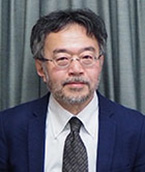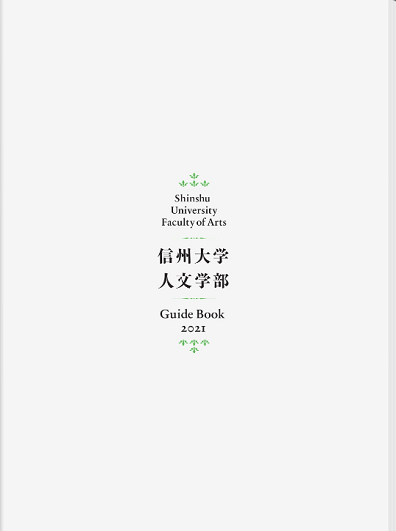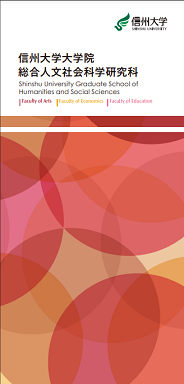Faculty of Arts
Summary
Department of Humanities aims to inquire into the essence and various activities of human beings together with their cultural and social systems, etc.
- We are giving questions about "Human" and "World," and thinking on those questions in order to find new perspective of them.
- We will elucidate the mechanism of human actions and social activities through scientic research and analysis.
- We will deal with various problems of modern and local societies, both theoretically and practically, from viewpoints of sociology and information scrience.
- We will analyze human and social events in demontrative manners, focusing upon history, culture, and custom.
7 Courses of Faculty of Arts
Philosophy & Art Communication
The course consists of Philosophy and Art Communication.
In seminars of Philosophy, students can learn the manner of philosophical thinking of mind, language, logic, and ethic, not only from contemporary and modern western philosophical viewpoints but also from classical philosophical approaches, including Asian philosophies.
In seminars of Art Communication, on the other hand, students excercise active learning of "art literacy" through various workshops of music, paintings, dance, etc., in which they participate by themselves.
Cultural Information & Sociology
In Studies of Cultural Information, students will acquire the mastery of "practical use of information" in unifying different fields of social linguistics, cognitive and social psychology, and sociology.
Sociology provides students with basic theory of empirical sociology and various methods of social researches and fieldwork.
Pcychology & Social Pcychology
In Psychology, students learn scientific approach to behavior and mental process by systematic analysis of psychological phenomena.
Social Psychology deals with our daily experience of social phenomenon, through the empirical method of investigation. In communicating with others, including other students and citizens of the city, students' knowledge of social psychology changes to "living technique" for critically thinking our society.
History
The course consists of Western History, Eastern History, and Japanese History.
In the field of Western History, students learn the history of Europe.
In the field of Eastern History, Asian history is examined especially focusing on the relationship of China to other Asian countries.
In the field of Japanese History, students will consider what comes next in the future, by critically reflecting on what happened in the past of this country.
Comparative Language and Culture
The course consists of Comparative Literature, Chinese Language and Literature, German Language and Literature, and French Language and Literature.
Comparative Literature uses the interdisciplinary approach to literature, especially taking both perspectives of classical European literature and modern European literature into consideration.
In the field of Chinese Language and Literature, students learn practical use of Chinese as well as interpretation of Chinese literature.
In the field of German Language and Literature, students learn the language, literature, and culture of German-speaking countries.
The field of French Language and Literature aim to educate the person who has sophisticated, international-communication ability through the knowledge of French and French literature.
English and American Language and Culture
In English Linguistics and Philology, students learn history, semantics, social and cultural backgrounds of English.
In the field of English and American Literature, the abilities to critically read and interpret Anglo-American literature and film arts are learned.
Japanese Language and Culture
In seminars of Japanese Literature, students learn positivistic approachs to mediaval, pre-modern, modern and contemporary Japanese literature, which is based on philological analysis and interpretation of the texts.
Japanese Linguistics offer lectures and seminars for linguistic and philological investigations of Japanese language, including dialects.
In the field of Teaching Japanese as a Foreign Language, students examine various problems of contemporary Japanese language and its education, and learn what the essence of human communication through language is.
Dean's Greeting

Professor Tadashi Kanai
What is the humanities? Put simply, it's the study of human beings. It's a way of thinking about life and living that's based on these thoughts. The Faculty of Arts at Shinshu University offers a range of subjects, including philosophy, history, literature and languages, as well as sociology and psychology. It's a place where you can learn and do research about human beings in a wide range of ways.
The faculty name JINBUNGAKUBU at Shinshu University is, as mentioned above, translated into English as 'Faculty of Arts'. 'Arts' here means ' Liberal Arts', which come from ancient Greece and are understood as the arts and crafts for living freely. I specialise in art history, so I would like to consider the connotations of the word 'art'/'arts' in this context. Art is about more than just expressing yourself and being original; it can also criticise, change how you see things and add value. Look at the strokes of Katsushika Hokusai, Pablo Picasso's Guernica, Joseph Beuys' 'social sculpture' and Yayoi Kusama's Infinite Web. They question common sense and frameworks and open up new values. These are more than just a distraction or a hobby. The 'Arts' of the humanities have similar strengths.
Habits, interests, rationality and economics are often at work in our daily lives, and we tend to take shortcuts and quick paths. The bottom line is that it saves us time and effort to think and pause, but in the process other possibilities and other perspectives are often lost in the process. Is the idea of KOSPA (cost-performance) and TAIPA (time-performance) performative?
Does the 'win-win' mentality ignore the external 'losers'? This is actually a very big problem. In the past, when society as a whole was able to move forward in a unified manner, supported by advances in technology and media, there would have been some hope for the consolidation of a 'strength in numbers' vision and the results of selection and concentration, but in today's increasingly complex and unstable society and environment, we are constantly exposed to unpredictable problems.
The horizon of expectations is completely unclear. If this is the case, it is rather the change of direction, the change of perspective and the constant maintenance of space for other possibilities that supports sustainability and essential crisis management. This is where the importance and strength of humanistic practice becomes apparent. The art of learning in depth, always open to the outside world, always in communion with others - the roundabout way rather than the short cut or the fast track - to see human beings from a variety of perspectives. It is no exaggeration to say that it is a survival skill, a survival art, that goes beyond a way of learning.
In other words, there is a reason and a value for the humanities to be a 'slow' discipline that does not rush to conclusions or evaluations. If this is the case, then I feel that rushing to talk about effectiveness is not at all like the humanities, so I will end my essay here. I hope that you will first approach the study of the humanities as if you were opening a book to try it out. If it leads you to a lifetime of exploration, so much the better. I hope that the power 'faculty' of the humanities will continue to sustain your sense of life, just as the centuries-old arts still promise to move us today.
Publications
Guide Book for Faculty of Arts

This is annual guide book for introducing our faculty of arts.
Gude Book for Graduate School of Humanities

This is annual guide book for introducing our Graduate School of Humanities and Social Sciences.
Basic Ideas and Policies
Basic Ideas
Nestles in Shinshu's four season natural environment, far from the hustle and bustle of the city, the Faculty of Arts provides education that focuses on living harmoniously with both man and nature while dealing with related issues. We aim to educate the "Neo Humanists" for the coming age who cannot only consistently adopt a fundamental approach to all aspects of multifaceted contemporary society, but also criticaly and creatively consider such approach with their acquired practical wisdom.
Educational Research Goals
General educational goals at the faculty of arts are:
Students should develop practical mastery of critical and creative thinking, and this primary goal includes the achievement of the following more specific skills:
- The general ability to take a critical stance to what they already know and generate an innovative comprehension of it.
- Appropriate discernment of sea changes in the world and unwavering intellectual daring amongst it.
- The general ability to generate path-breaking future visions through critical assessment of historical/cultural tradition.
- Competence for making cross-cultural-cum-balanced judgment in confrontation with unfamiliar cultures and societies.
Students should develop practical mastery of the following hands-on skills for action.
- General information skills, such as data finding or quantitative reasoning.
- Communicative skills: Students should be able to show appropriate understanding of various and diverse views, and also be able to organize and express their own ideas effectively.
- Foreign language proficiency in the increasingly complex global environment: students should be able to converse and communicate with people of different cultural backgrounds.
- Creative potentialities for addressing and resolving complex interdisciplinary issues.
Three Policies of Faculty of Arts
Policy of Graduate Certification and Academic Degree Award
We will confer degree on students whose graduation these are accepted after their acquisition of practical skills of critical thinking and active learning, etc., following our education policy.
Policy of Curriculum Design
Under our academic policy and goals, we will design our education program as the systematic and interdisciplinary one that covers various theme and topics, for the aim of development of students' academic skills for their special fields of Humanities.
Policy of Enrollment acceptance
Our examination aims to select students who can enjoy studying and have interests in human nature, society, history, culture, languages, literature, information, and arts, because "practical knowledge" presupposes exactly such talents and interests.
History
| 1919 | Foundation of Matsumoto High School |
|---|---|
| 1949 | Foundation of Shinshu University |
| 1966 | Foundation of Faculty of Arts |
| 1978 | Reformation of Faculty of Arts (The faculty is divided from the faaculty of economy) |
| 1982 | Froundation of the Graduate School of Humanities (Master Program) |
| 1995 | Two departments start |
| 2004 | Foundation of Incorporated Administrative Agency Shinshu University |
| 2007 | Reformation of organization and curriculum |
| 2013 | Change to one department from two departments |
